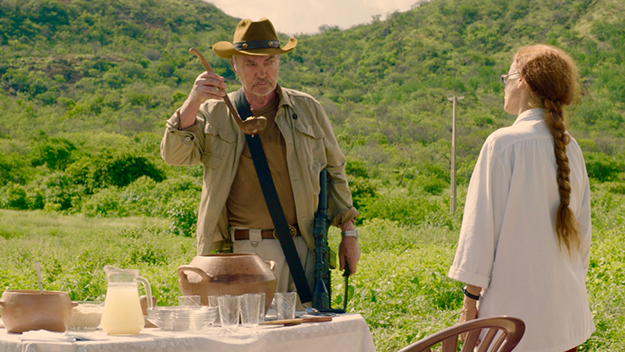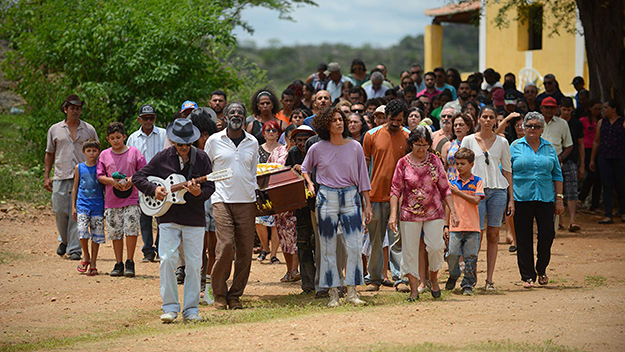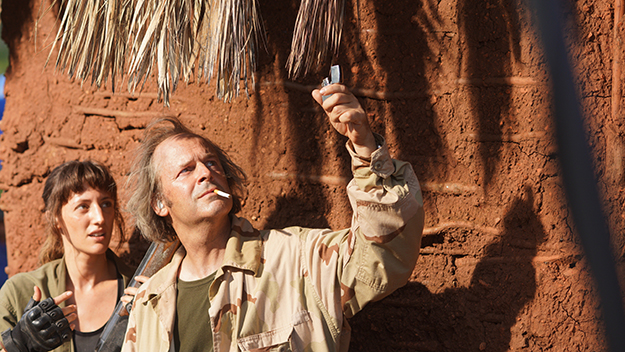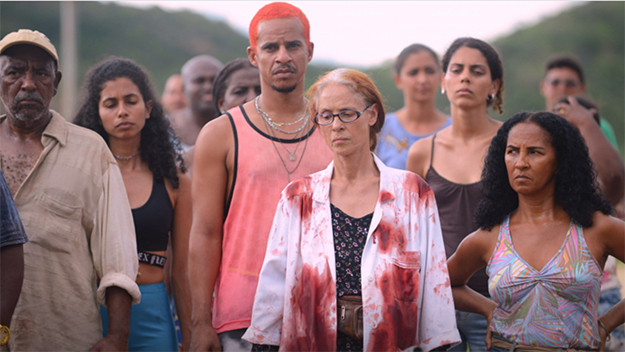Film of the Week: Bacurau Redux

All images from Bacurau (Kleber Mendonça Filho and Juliano Dornelles, 2019)
This review first appeared in May 2019 during the Cannes Film Festival. It has been slightly amended.
Two days into the 2019 Cannes Film Festival, the Brazilian film Bacurau got me into a Twitter discussion with a Latin American critic and programmer who felt that certain films from certain countries get a bad response if they don’t conform to the stereotyped national image that foreign viewers are used to. I’m not sure that’s the case with this film, by Kleber Mendonça Filho and Juliano Dornelles: Bacurau seems to fit quite well with a familiar available image of Brazilianness, a certain effusive, sometimes violent and melodramatic amplitude that I don’t imagine will strike many people as altogether outside the known. What Bacurau certainly doesn’t correspond to is expectations about the cinema of the better known of its two directors. From my point of view, that’s partly where Bacurau disappoints—but also where it provides some intriguing surprises.
Mendonça Filho rose to international prominence with his films Neighboring Sounds (2012) and Aquarius (2015), both of which certainly did buck expectations about Brazilian urban drama. In its most commercially successful latterday variant, from Walter Salles’s Central Station through Fernando Meirelles’s City of God to José Padilha’s Elite Squad, that mode has tended to highlight urban deprivation and disadvantaged outsiderhood, and in the latter two cases, spectacular violence, often in a favela setting. Mendonça Filho’s films, both set in the northeastern city of Recife, were different: Neighboring Sounds was not just urban but urbane, a witty, visually elegant ensemble drama about the stresses and pleasures of city life, while Aquarius, an expansive neo-melodrama showcase for veteran star and national screen icon Sonia Braga, was set in a privileged middle-class milieu, and celebrated an older woman’s refusal to age quietly as she rebelled against property developers and reveled in her sexuality.
Bacurau is co-directed and co-written by Mendonça Filho with Juliano Dornelles, production designer of his previous films (Dornelles’s own solo debut is imminent). You can tell from the start that it’s a departure. Some very ’80s-looking titles kick the film off to the sound of Gal Costa singing a lushly orchestrated Caetano Veloso ballad (par for the course for him so far) over an image of space glittering with stars, as the virtual camera slowly zooms in on the planet earth and eventually, descending through the clouds, a real camera shows an stretch of road in Brazil’s northeastern Pernambuco region—“in a few years from now,” a title points out. A young woman, Teresa (Bárbara Colen, from Aquarius) is hitching a ride in a water truck, returning home to her distant village of Bacurau, here in Brazil’s largely uncultivated sertão, or outback. But there has been a crash on the road and the tarmac is strewn with coffin after coffin, establishing a leitmotif: expect much death ahead.

Bacurau, the apocryphal setting for the film, is currently short of water—the local mayor, a glossily packaged sleazeball named Tony Junior (a strikingly nasty, comical Thardelly Lina), has dammed up the local river to increase the villagers’ dependency and submission. It’s not working, nor is it dimming their celebratory sense of community spirit: village doyenne Carmelita, Teresa’s grandmother and the mother of schoolteacher Plinio (Wilson Rabelo) has died, and the village is sending her off in style with a parade and a chanted funeral song that briefly promises the film into an ensemble musical. There’s also an ancient guitarist—the local venerable bard, as it were—who’s ever ready to fit improvised satirical verses to some melancholy chords, and I could have done with a lot more of him. And there’s a formidable dissenting voice on site: local doctor Domingas, played by Sonia Braga, looking considerably fiercer and more wizened than in Aquarius, hurling showers of vitriolic invective against the deceased.
For the first hour or so, Bacurau is a very lively depiction of fictional village life, with too many characters to quite get a purchase on, although that’s what makes the film buzz. For a while, everyone’s general eccentricity and their relationships suggest a Brazilian answer to Gabriel Garcia Marquez’s fictional town Macondo, or perhaps a tropical version of Emir Kusturica: that bard, the cheerfully active mobile brothel, the general agitation (although thankfully no-one gets around to slinging geese at each other, Kustu-style).
But mysterious and ominous portents are at hand. No one can get a signal on their mobile phone, and suddenly Bacurau seems to been erased from all online maps. The tone shifts radically and suddenly when two mysterious bikers turn up dressed in lurid day-glo one-pieces that make them look like circus clowns. At first they’re disarmingly calm but cordial visitors, but then they produce their firearms and add to the pile of corpses that has already accumulated at a nearby farm—a vision prefigured by a dream-like sequence in which runaway horses gallop through the village streets at night.

What’s behind this all, we discover, is the presence in the vicinity of a death squad, largely composed of Americans, led by one Michael, played by Udo Kier—and it doesn’t take much more than Kier bursting suddenly through a door to make any film shift radically in tone. Michael’s group seem at first to be mercenaries, but are apparently tourists paying for a lethal safari where they get to hunt down and kill humans. This leads to a certain amount of overstatement and indeed stereotyping—Americans, they’re gun crazy!—with more than a couple of wild-eyed, hyperventilating performances. One woman talks nostalgically about how, as a child, her grandfather’s gun collection made her fall in love with the Thompson machine gun; later, tracking down an escaping couple, she whoops, “This is awesome!”, then after the kill, calls to her male partner, “You wanna fuck?” There’s much clunky racist banter among the group too, although the notion of cultural blindness is more acutely made in the hunting party sequences when Michael tells the two bike riders not to speak Brazilian (sic) in his company. There’s also a techno-fantasy element that’s quite jarring: the party’s use of what first seems to be a UFO, shifting the film squarely into magical realist territory, but then proves to be a drone through which they track their kills on a computer screen (all things considered, magical realism might have been more satisfying).
As the violence revs up, the film shifts into more of a spaghetti Western mode, although that is already present in the film from early on, the village streets clearing in protest when Tony Junior pays a visit, the camera reviewing the empty space with a distinct echo of Sergio Leone. Things get super brutal as the villagers fight back against the invaders, fueled on powerful locally grown psychotropics, and they also get pretty strange: in one scene, Michael and Domingas face off against a table of Brazilian stew and cashew juice to the sound of “True” (is there a more incongruous use of Spandau Ballet in all cinema?). There’s also one great, rather Tarantino-esque sight gag, when the camera scans the walls of the local museum, and you realize that the people of Bacarau are very well equipped to defend themselves.
There are other characters involved: notably, a man named Pacote (Thomas Aquino), who briefly prefers to be known as Acacio, then suddenly changes his mind; he’s the lover of Teresa, and a notorious (but presumably Robin Hood-ish) outlaw, whose Top 10 lethal heists are seen on a TV show. Also in the mix is a sexually ambivalent, semi-legendary eco-warrior named Lunga (Silveiro Pereira), who’s on the run and hiding out in the tower of a nearby ruined dam, together with his sidekicks. There are so many characters, in fact, and so many unresolved strands, that I ended up suspecting that a great deal of material might have been excised before the final cut, as if we were watching the boiled-down version of some expansive TV mini-series; these days, of course, so many feature film makers have absorbed the narrative logic of long-form TV that this kind of apparent incompleteness is something that’s becoming quite prevalent, and that we’re increasingly learning to live with.

Still, the film’s cavalier disregard for conventional focus and clarity is immensely frustrating. Teresa comes home from somewhere else, but what’s she been doing (if we’re told, I missed it)? And, although she’s set up at the start as a central figure, she largely disappears for most of the action; I was by no means clear, either, about the back stories of Pacote and Lunga, the latter particularly larger than life and stranger than the film’s ostensibly realist framework can accommodate. As for the lifetime’s friendship turned to enmity between Domingas and Carmelita, the former’s thunderous outburst promises some dramatic unravelling—but before you know it, Domingas apologizes for behaving inappropriately, and Braga can go back to being magnificent as the village’s wise, indomitable new matriarch (and Braga, as we know, can do magnificent quite magnificently).
A key element in Bacurau is a tiny glimpsed detail: a shot on a TV screen that shows news coverage, with caption, of public executions taking place in Sao Paolo. The story is set, remember, in Brazil “a few years from now”—and although the project was in the works long before anyone imagined Jair Bolsonaro becoming the country’s president, as he did in January 2019, Bacurau is packed with both protest and what seems a prophetic intensity. You might see Tony Junior as a very small-scale regional Jair, seizing the control of the local resources and wreaking destruction (Bolsonaro is so much not a friend of the environment that he is tantamount to being its punitive sworn enemy, a dedicated exterminator like Michael). Bacurau makes most sense—as does its narrative disorderliness—as a super-strength package of satiric rage, super-strength like those psychotropic drugs we see intermittently popped into mouths in extreme close-up.
There’s lots to admire and enjoy here, in the performances and the visuals, notably the hot colors of Pedro Sotero’s photography (whether in the clothes of schoolchildren or the blazing blood reds of the evening sky) and the way that widescreen makes the vast, cactus-rich landscapes a perfect backdrop for the bizarre mix of genres: war movie, Western, surveillance sci-fi, the cangaço (bandit) drama that’s a traditional strand of Brazilian cinema. Bacurau, ultimately, isn’t to my taste. It’s an ungainly, sometimes ugly mess, but in our ever-intensifying age of rage, righteous or otherwise, we can expect to see a lot of hothouse cinema blooming from a fertile ground of protest and fury. Frustrating as it is, Bacurau fulfils that description with flourish and ambition.
Jonathan Romney is a contributing editor to Film Comment and writes the Film of the Week column. He is a member of the London Film Critics Circle.







